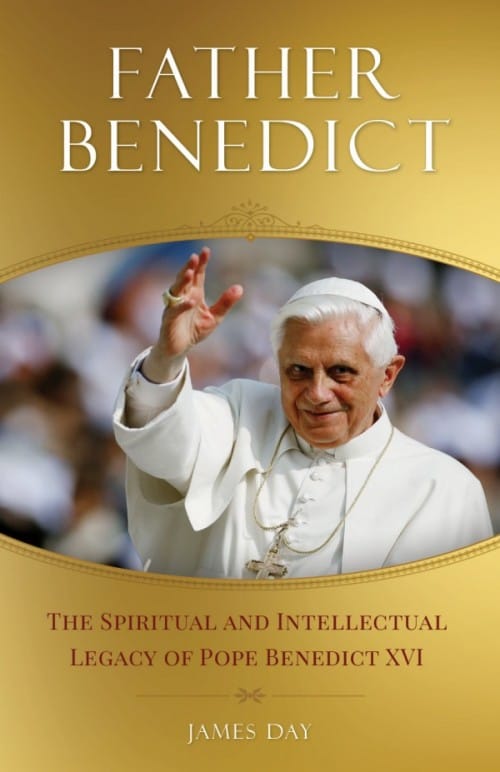Editor’s note: In commemoration of the recent death of Pope Benedict XVI, Catholic Exchange is issuing a series of reflections on some of his most monumental encyclicals, excerpted from James Day’s 2016 book Father Benedict:The Spiritual and Intellectual Legacy of Pope Benedict XVI.
In a passage in Introduction to Christianity, Professor Ratzinger shows how Jesus both actualizes unconditional love and is a model for manhood. Today, in a time of absent fathers, Ratzinger personalizes the Creedal axiom “and became man,” explaining that man is meant to live for the other. Man is true man by sacrificing his desires for the well-being of those he loves. For the priest, it is a duty to the faithful entrusted to him; for those in marriage, a duty to wife and family; for the single and widowed, an openness to respond where one is needed. “Man is man by
reaching out infinitely beyond himself, and he is consequently more of a man the less enclosed he is in himself, the less ‘limited’ he is.” The presence of Jesus in our midst blows open the enclosed, limited existence of choosing individualism over the other, selfishness over selflessness: “We have come to know and to believe in the love God has for us” (1 John 4:16).
The cult of individualism leaves in its wake not hope and joy, but sadness and cynicism. “In the end all that counts is one’s own interest.” This is the legacy of Adam’s desire to be like God (cf. Gen. 3:5). But Jesus is the new Adam. He is not meant to be a model beyond one’s grasp, “an absolute exception, a curiosity, in which God demonstrates to us what sort of things are possible. His existence concerns all mankind.” Jesus shows us man’s mission to live and love. His obedience to God’s will—“not my will, but yours be done” (Luke 22:42)—becomes the will of God; the two are not opposed but linked. Jesus demonstrates that the role of man is not omnipotence but sonship; it is obedience to the needs of others. As adopted sons and daughters of God, we become the Body of Christ. This is what Benedict means when he tells us that faith is not solely a private experience, but demands interrelationships. It also illustrates the essence of eros, philia, and agape: union with the other. “We become ‘one body’, completely joined in a single existence. Love of God and love of neighbor are now truly united: God incarnate draws us all to himself.”
Just as we yearn to share joyful moments and occurrences with another, so too is the intention of the ultimate
fulfillment of the Kingdom of God: everlasting union in the light of love that Dante described and that Benedict seeks to reintroduce to us. He dares us to raise our eyes from the ground to the heights of eternal possibility. But it does not come without a price. While on the Cross, Christ reached down into the depths of human existence so as to lift it up. This “descent into hell” leads us to ponder Benedict’s next encyclical, Spe Salvi, “in hope we were saved” (Rom. 8:24). In Spe Salvi, Benedict chose not to lament the passing of the old way of “ghettoized Catholicism” or to cower from secularism’s agendas as mere signs of the times, or to dream of a utopian future
apart from worldly problems. “Christian faith is not just a look back at what has happened in the past, an anchorage in an origin that lies behind us in time; nor is it just an outlook on the eternal; it is above all things a looking forward, a reaching-out of hope.”
Benedict points out that the concept of hope is not lacking in our time but is misplaced. The result is like Babel, where sin is not overcome but festers and each individual vies for his own idea of hope and his own desires. Hope cannot be properly contemplated without returning to the Cross. To defy death, God in the person of Jesus took on
the whole of human suffering. To each person who finds himself alone, suffering, abandoned, desperate, or proud and presumptuous, Jesus says: I am with you, and will raise you up.
One of Joseph Ratzinger’s favorite themes, “com-passion,” which means “to suffer with,” is applied here. Citing Saint Bernard of Clairvaux and reflecting on the Passion of Christ, Pope Benedict said: “God is love, and the deeper one’s union with God, the more full one is of love. And though God cannot endure pain, he is not without compassion for those who do.”
Benedict then leaps beyond the theological into our everyday realities: “The true measure of humanity is essentially determined in relationship to suffering and to the sufferer.” The reality and lasting significance of faith, hope, and love are meaningful only if they are lived. This message inevitably clashes with the temptation today to dispose of any person across life’s spectrum considered unable to contribute to society, irrespective of how such contribution is defined or who defines it—relativism at its finest. “A society unable to accept its suffering members and incapable of helping to share their suffering and to bear it inwardly through ‘com-passion’ is a cruel and inhuman society.”
Here in Spe Salvi, Benedict makes it clear that our hope must not be individualistic. Rather, our priority must be the dignity and care for the body and soul of each individual. “A world which has to create its own justice is a world without hope.” The capacity to accept suffering for the sake of goodness, truth and justice is an essential criterion of humanity, because if my own well-being and safety are ultimately more important than truth and justice, then the power of the stronger prevails, then violence and untruth reign supreme.
Benedict introduces the meaning of con-solatio—consolation—as “being with” the other. Con-solatio and com-passion form our life’s purpose, which is to renounce self-love in order to see the essence of others.
Image by Marco Iacobucci Epp on Shutterstock















